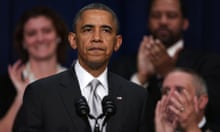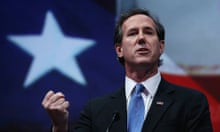Statisticians dismiss the practice of using personal stories to argue about an objective reality as "anecdata", but it might be more accurate to call the "Obamacare horror stories" that have taken over social media "urban legends". There are urban legends about a lot of things – from spiders in hairdos to red velvet cake. Some are funny, some feature a satisfying come-uppance, but folklorists agree that the stickiest of them, the ones that last for generations and resist debunking are the ones that live off ignorance and feed off fear. As one researcher put it:
It's a lack of information coupled with these fears that tends to give rise to new legends. When demand exceeds supply, people will fill in the gaps with their own information … they'll just make it up.
I can't think of a better description of the conservative media ecosystem at the moment.
The failure of the exchanges created an information vacuum as far as Obamacare successes went; in rushed the individual stories of those who claimed to have been hurt by the changes to the market. It didn't matter that these stories are, even without enrollment numbers from the exchanges, demonstrably unrepresentative! Only a fraction of Americans, 5%, even have the kind of policies that could have been cancelled – these were the people who could claim to have been "lied to"… or worse. Their stories became part of an Obamacare horror story canon. There is the one about Ashley Dionne, who claimed that Obamacare "raped" her generation:
I have asthma, ulcers, and mild cerebral palsy. Obamacare takes my monthly rate from $75 a month for full coverage on my "Young Adult Plan" to $319 a month. After $6,000 in deductibles, of course.
It turned out that her own Tumblr post contained evidence that she would be eligible for a low-cost, "silver" plan for $22.17 per month, with out-of-pocket spending capped at $2,250. (Also, with her medical conditions, it's hard to believe that she ever found a company to cover her pre-ACA.)
What about Jessica Sanford, who went from being an Obama voter name-checked as a success story – going from uninsured to covered – by the president himself to complaining on Facebook that she got "screwed"? CNN got the exclusive. She had thought, due to a state exchange error, that she and her son were eligible for a policy that cost only $169 per month. When Washington state made the correction, she claimed that the cheapest plan she could find was $324 per month and that she would have to just go without insurance, instead paying the monthly $95 penalty.
Except that makes no sense at all, because Sanford told CNN that her son has ADHD: that makes him eligible for Medicaid coverage at $30. Okay, she needs to get her own policy, and can't count her son as a dependent. She said she's 48 and her salary was "a little less than $50,000", which makes her eligible for a "bronze" Washington exchange plan at $237 per month. Granted, $267 to cover the family is a lot more expensive than $169 … but Sanford also said that her son's condition meant they previously spent $250 per month on medication alone, plus "regular doctor visits" – both of which Medicaid will fully cover. So the Sanford family could go from spending $250 per month on her son's medication alone (plus some unknown some for doctors) to spending just $17 more for a coverage that for her would meet the ACA's minimum standards and mean premium coverage for her son. It's her right to do what she wants with her money, but what's scary about this story is her apparent lack of concern for her own health.
Then there's the cancer patient who in the Wall Street Journal blamed Obama for the loss of her insurance plan that she "liked" and wanted to keep. Her insurance company made the decision to kick her off last May. It is true that she will be losing access to the range of specialists she had under that plan, but she will be able to get a plan if she wants one – other companies can't deny her because of a pre-existing condition – and it will be cheaper.
I would find the prospect of not being able to get insurance at all, which was the plight of many cancer patients prior to the ACA, much more horrifying. Which reminds me of Bill Elliott, who told Fox News that he was going to choose to forego cancer treatment and "let nature take its course" rather than pay for the $1,500 per month plan his "insurance guy" offered to him under Obamacare. Another Obama voter, too! But … in in his state, South Carolina, the most expensive plan on the market for someone over 50 (a guesstimate by one fact-checker) is $768 a month. If Elliott is five years younger, it's just $440. He also said his "guy" told him that the $1,500 per month plan wouldn't pay for pharmaceuticals or medical devices – something even the most ardent Obamacare critic must realize is illegal under that law. That's one of the things they don't like about it! Perhaps the real conclusion here is that Elliott needs to fire "his guy".
Still, $440 is a lot more than the $170 per month he said he had been paying. So conservatives celebrated when it turned out a local attorney was able to find a sympathetic ear (Tea Party fav South Carolina Governor Nikki Haley) for the argument that Elliot's original insurer was breaking a law older than Obamacare – HIPAA – by cancelling his insurance. The funny thing is that the 1990s law that seems to have allowed Elliott to get his coverage back is the kind of must-cover mandate they also don't like about the ACA.
The mechanisms Elliott's lawyer, Steven Tucker, says he's using are sketchy-sounding? His argument sounds a lot like "one weird trick" ads, what with his repeated mention of "Using public law 104-191 section 2742" and frequent urging of others to do the same. But I'm glad Elliot is going to fight the good fight against cancer.
(This week, Elliott and Tucker say they're being audited by the IRS in retaliation for, well, it's either the negative publicity they gave the ACA – in which case why them? – or, I dunno … maybe there's more to the story?) And we're not done yet. Maybe you heard about the Arizona leukemia patient who was angry that he could no longer use his $855 per month policy and said he'd have to pay $26,000 beyond his wife's policy to continue seeing his preferred doctors …. That story went viral. The follow-up, in which he found a cheaper plan that included his doctor and reduced his overall out-of-pocket costs, did not receive as much attention.
There's nothing new about the general practice of using cherry-picked outcries in lieu of data. Inflammatory personal testimony has been a staple of not just bad journalism but bad debating since humans first started arguing with each other. ("Don't eat from the tree of knowledge? Let's hear from one expert who says you should!") But social media has its own set of biases and limitations that make it an especially fertile ground for the context-free compelling individual narrative, not the least of which is the fact that "social media" is still a thing that "the media" considers separate from itself. That distinction is thin, considering how much traditional outlets have allowed themselves to get caught up in the pace of those less demanding mediums. CNN wants to move at the pace of @cnn, so they (and other outlets) wind up reporting on TV and in slightly longer form stories that are not much more than pass-along tips. They get to report on something "going viral" without weighing in on whether it's true or not. The Ashley Dionne story is an especially head-to-desk-thumping example: CBS, Yahoo, and Mediaite reported on the story's viralness, they did not take the time to point out the holes evident from Dionne's own report.
Dionne, Elliott, and Sanford all proactively put their stories out on social media – Dionne on Tumblr, and the latter two on Facebook. That a bogus story spreads on social media isn't mainstream media's fault; social media is practically designed to spread bogus stories. The limitations of the medium are obvious – not just in the literal limitation of a Twitter character count, but in the looseness of the connection between a story and its original source in almost every social media form. People don't expect to be given context, or links to further, possibly complicating, information. And if the context or source material is provided? The chances are pretty good no one reads it anyway.
That bias – or explicit opinions – plays a role in what attracts the most "sharing" is actually quantifiable, though unsurprising: One statistical analysis of traditional news outlets' content versus what goes "viral" on social media has shown that stories that go viral tend to contain both highly-opinionated language and focus on "niche" topics.
Obviously, the Obama horror stories slide neatly into the space the researchers describe: that they became the focus of national attention is beside the point to those that shared them. Conservatives believe the stories are not covered enough. As for "highly opinionated" language – both Dionne and Elliott illustrate a willingness to go to rhetorical extremes. The researchers did not think to figure "fear" into their research, though at this point the parallel between what a viral personal narrative and an urban legend is exact enough that we can almost use the terms interchangeably. One of them is easier to fact-check than the other, neither get fact-checked that often.
It's not the fear of death that propels these modern urban legends; it's fear of change. The through line that connects all of the Obamacare legends is the sense of powerlessness that's also the tenuous thread binding together a fracturing GOP.
Can you win elections out fear? Of course you can. Does it bode well for the country? It scares me.











